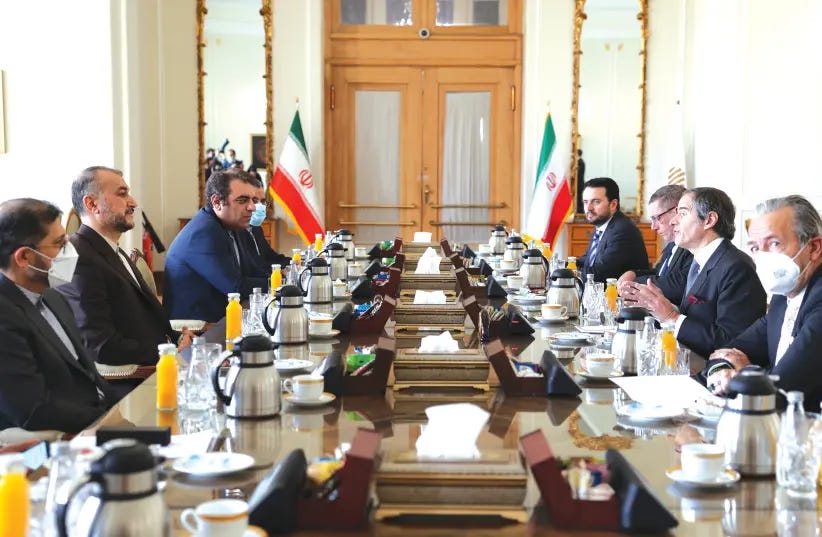US, Europe plan resolution calling on Iran to answer IAEA questions
The State Department said the U.S. would join UK, France and Germany in a resolution calling on Iran to fully cooperate with IAEA at agency board meeting next week, as IAEA DG traveled to Israel.

The United States plans to join three European powers in a resolution calling on Iran to fully cooperate with the UN atomic watchdog agency at a meeting in Vienna next week, the State Department said today.
The announcement came as International Atomic Energy Agency (IAEA) Director General Rafael Grossi landed in Israel ahead of an expected meeting with Israeli Prime Minister Naftali Bennett on Friday.
“I can confirm we plan to join the UK, France and Germany” on a resolution “focused on the need of Iran to fully cooperate with the IAEA,” State Department spokesman Ned Price told journalists at the State Department briefing today (June 2).
“Our message is on what Iran needs to do,” Price said, adding it needs to answer the IAEA’s questions about suspected past nuclear work under its obligations under the nuclear non-proliferation treaty (NPT).
The IAEA board of governors is due to hold its quarterly meeting in Vienna next week.
“The idea is to have a Board resolution on safeguards,” a European diplomat said yesterday.
“Otherwise nothing is moving,” the European diplomat said, referring to diplomacy on trying to close gaps on restoring US and Iranian full implementation with the 2015 Iran nuclear deal, the Joint Comprehensive Plan of Action (JCPOA).
Lead Iranian nuclear negotiator, Deputy Foreign Minister Ali Bagheri-Kani, traveled to Norway for meetings with his Norwegian counterparts this week.
Norwegian Deputy Foreign Minister Henrik Thune tweeted that in the meeting, he encouraged Iran “to fully cooperate with the IAEA and swiftly reinvigorate the JCPOA.”
But the European diplomat who spoke about plans for a resolution in Vienna next week said he was not aware of a more concerted push around Bagheri’s trip to close the gaps for reviving the JCPOA.
Economic reforms Iran introduced in May were apparently predicated on the assumption that Iran would have restored the JCPOA, Iranian economics expert Bijan Khajepour suggested at a breakfast hosted by Al-Monitor on June 1.
“In my view, their calculation was that it would have happened earlier this year, because…Iran has started this so called ‘economic surgery,’” Khajepour said, describing calling a source in Tehran about an element of the reforms that would provide cash subsidies to the poor that was announced about three week ago. “And he said, ‘their calculation was that…the JCPOA talks would achieve a positive outcome by March. Hence the plan to introduce the economic reforms by May.’”
Khajepour also suggested that some Iranian policymakers may (mistakenly) believe that US President Joe Biden may not want to want to rejoin the JCPOA before the US midterm elections in November, or may somehow be willing to show more flexibility to get the deal after the midterms.
“It doesn’t make sense when we apply our logic to the decision, but there are always layers of or rationales on the Iranian side that has to do with the internal distribution of power with the different big political decisions they have, whether it's succession or different policies,” Khajepour said. “So it’s very sad, especially because the release of the Iranian [prisoners] in Iran will also be tied to the success of the JCPOA talks. But I think the real movement may come after the midterm elections.”
An IAEA report dated May 30, 2022 describes the Agency increasingly struggling to ensure the peaceful nature of Iran’s growing nuclear program under transparency measures that Iran reduced in early 2021 in response to crippling economic sanctions imposed by the Trump administration after it quit the deal, and the assassinations of personnel and sabotage that Iran suspects to have been carried out by Israel.
“From 23 February 2021 onwards, the Agency’s verification and monitoring activities have been seriously affected as a result of Iran’s decision to stop the implementation of its nuclear-related commitments under the JCPOA, including the Additional Protocol,” the IAEA reported to the board.
**


